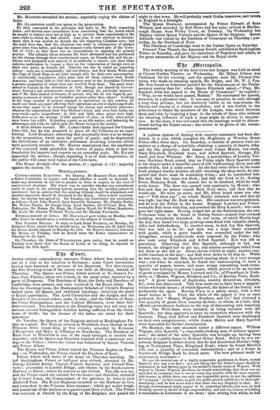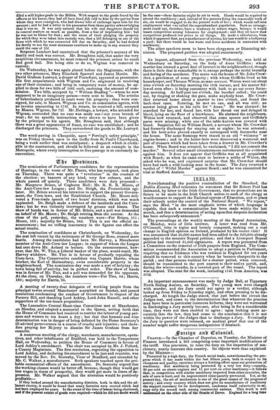Zbt filttropotis.
The weekly meeting of the Anti-Corn-law League was held as usual at Covent Garden Theatre, on Wednesday. Mr. Milner Gibson was Chairman for the evening ; and the speakers were Mr. Thomas Gis- borne, who made an amusing speech, Mr. Bright, and Mr. W. J. Fox. Mr. Fox found an historical parallel for the fruitlessness of the Parlia- mentary session thus far when Queen Elizabeth asked—" Pray, Mr. Speaker, what has passed in the House of Commons?" he replied- " Why, seven weeks have passed, Madam." He concluded his speech, however, in a gloomier tone. It was easy to perceive, he said, through a long vista perhaps, but yet distinctly visible in its remoteness, the blazing and roaring of a distant revolution ; and it was foolish in the aristocracy to blame the members of the League, who stood between them and ruin, by inspiring a hope in the minds of those who without the cheering influence of such a hope might be driven to despera- tion. At the close, it was intimated that the meetings would be discon- tinued during the Easter recess ; due notice to be given of the recom- mencement.
A curious system of dealing with country-customers has been dis- closed, in a case which occupied the Magistrate at Worship Street Police-office three days. On Saturday, a number of persons were ex- amined on a charge of unlawfully obtaining a quantity of shawls, silks, and the like property : their names were James Martin, law-clerk, Mary Elizabeth, Elizabeth Anne, and Alfred Spurrell, George, Ed- ward, and Jane Williams. Mr. Alton, a pawnbroker, of London Ter- race, Hackney Road, stated, that on Friday night Mary Spurrell came to his shop to pawn a beautiful piece of silk waistcoating, thirty and odd yards of silk, and a table-cover. As she had twice before in the same week pledged similar articles, all still retaining the shop-mark, he sus- pected that there must be something wrong ; and he questioned her. She said that her name was Beck ; and that she lived at 31, Goring Street, Hackney Road. He caused her to be detained, while he went to the house. The door was opened very cautiously, by Martin ; who first said that no person named Beck lived there, and then that he would ask. He went up stairs, and Mr. Alton heard some one else say—" Tell them yes " ; on which Martin returned, and said that all was right, but that Mr. Beck was out. His suspicion was strengthened, and he took the Police to the house. Sergeant Lambert and Police- constable Ball went with him, and arrested the Mary Sourrell ; who now gave her right name. Having lodged her at the Stationhouse, the two Policemen went to the house in Goring Street—atsmall four-roomed; building, wretchedly furnished. In one room, of which Martin kept the key, they found two large packing-cases filled with valuable shawls, silks, and haberdashery. In another room, in bed, lay Mrs. Spurrell, who was said to be ill: and here was a large closet crammed with goods, while a great bundle was concealed under the bed. Altogether, several coach-loads were removed by the Police ; who also took away Elizabeth and Alfred Spurrell. Ball was left in possession. Observing that Mrs. Spurrell, although in bed, was dressed, he obliged her to get up ; and sixteen sovereigns rolled from her dress as she did so. About eleven o'clock at night, another con- stable knocked at the door ; and Ball went down to let him in. While he was away, he heard Mrs. Spurrell running about in a very strange way ; and when he returned, he found her endeavouring to burn a quantity of papers, letters, and some scraps resembling bank-notes. Martin was striving to conceal a paper, which proved to be an invoice of goods consigned by Messrs. Learoyd and Co., of Pontefract, in York- shire, to " Messrs. Wigram, Brothers, and Co., of Barclay Place, Hack- ney." A great number of duplicates, country directories, circulars, &c., were also discovered. This firm turns out to have been a supposi- titious wholesale house ; of which Spurrell, the father of the family, was professedly the agent. Barclay Place is a paltry street, with a few small houses in it. From the whole of the papers it was at once gathered, that " Messrs. Wigram, Brothers, and Co." had obtained a vast quantity of goods from country-dealers ; to whom, as a bait, they offered extraordinary facilities in the way of discounting and renewing bills. The Willi :ruses were arrested, as being intimate with the Spurrells ; but they appeared to have no connexion whatever with the business. They, with Alfred and Elizabeth Spurrell, were discharged on their own recognizances ; whilst James Martin and Mary Spurrell were remanded for further examination.
On Monday, the case assumed rather a different aspect. William Wigram, alias Spurrell, "a respectable-looking man of military appear- ance," the father of the other Spurrells, was brought up, having been arrested at a public-house in Bethnal Green Road. Before he was ex- amined, Sergeant Lambert stated, that he had discovered Martin's lodg- ing, in Nottingham Place, Kingsland Road; where he found Martin's wife and a quantity of concealed haberdashery ; and at a house in Southwark Bridge Road he found more. The new prisoner made an explanatory statement— He was the natural son of a highly respectable gentleman in Essex, named Spurrell, who was now dead; and, not liking that his father's name should be impeached, he had latterly gone by his mother's family-name of Wigram. With respect to Messrs. Wigram, Brothers, he would acknowledge that there was no such firm in existence : but it was an every-day practice with the most respect- able houses, in which there was only one responsible party, to put the addition of "company " to their name, to give the public greater confidence in their sub- stantiality; and he had never heard that there was any illegality in that. Al- though circumstances might appear to be somewhat adverse just now, be bad formerly moved in circles of high respectability, and had the honour of holding a commission as Lieutenant in the Army; upon retiring from which, he had filled a still higher grade in the Militia. With respect to the goods found by the officers at his house, they bad all been bond fide sold to him by the parties from whom they were consigned, who had drawn bills of exchange upon him for the amount ; and be had a letter in his possession from those parties acknowledging that it was so. It was only natural that his wife and daughters should try to conceal matters as much as possible, from a fear of implicating him : but he was not to blame for that ; and the cause of their pledging the property for which they were taken into custody was, that a bill belonging to one of the firma with which he was connected fell due on Saturday, and he had desired his family to use the most strenuous exertions to make up in any manner they could the sum of 55/.
Sergeant Lambert had ascertained that the prisoner's account of his family and rank was correct. Mr. Broughton said, that under the very suspicious circumstances, Ile must remand the prisoner, unless he could find good bail. Not being able to do so, Wigram was removed in custody.
On Wednesday, he was again placed before the Magistrate, with the two other prisoners, Mary Elizabeth Spurrell and James Martin. Mr. David Graham Learoyd, a draper of Pontefract, appeared as prosecutor. His first acquaintance with Wigram and Co. originated in receiving one of their circulars; and being in temporary want of money, he ap- plied to them for two bills of 1001. each, enclosing the amount of com- mission. Two bills, accepted by " William Brading"—whom he now supposed to be an imaginary person—were sent to him. The articles of haberdashery produced in court were his property : they were con- signed, for sale, to Messrs. Wigram and Co. as commission-agents, with an invoice amounting to 173/. In return, he received a bill, accepted by Messrs. Wigram, for 721. Mr. Heritage, a lawyer, who attended for Wigram, contended that no case was made out—not even breach of trust ; for no specific instructions were shown to have been given by the principal to his agents. Mr. Broughton said, that although there was a great appearance of fraud, no case was established ; and he discharged the prisoners. They surrendered the goods to Mr. Learoyd.
The wood-paving in Cheapside, upon " Perring's safety principle," was on Friday thrown open to the traffic from St. Paul's Churchyard, being a week earlier than was anticipated : a despatch which is credit- able to the contractors, and should be followed as an example in the Metropolis, where every interruption to free passage is so extremely in- convenient.



























 Previous page
Previous page